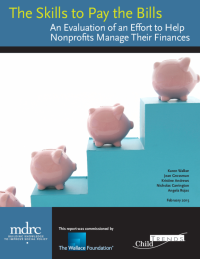The Skills to Pay the Bills
An Evaluation of an Effort to Help Nonprofits Manage Their Finances

Nonprofit organizations, which deliver many of the social services Americans receive, often face financial management challenges that affect the quality of their services. First, they face complex public and private funding environments that impose substantial administrative burdens and economic uncertainty. Second, many have insufficient internal capabilities (many organizations would call these “capacities”) to respond to these realities. This report examines how 25 Chicago-based organizations responded over a four-year period to an initiative designed to address these two aspects of their financial challenges.
Between 2009 and 2013, the Wallace Foundation funded a management consulting firm, Fiscal Management Associates, to provide the 25 nonprofit organizations that participated in the project with one of two models of professional development: (1) a customized model that included substantial individual consulting and group learning for organizations’ leaders, or (2) a model that provided primarily group learning opportunities. The foundation also provided grants to the 25 organizations designed to offset some of their costs. Simultaneously, the Wallace Foundation funded the Donors Forum, a Chicago-based organization, which worked to improve the public funding environment for nonprofit organizations in Illinois. During the evaluation period, the Donors Forum provided staff support to assist four state human service agencies in their efforts to implement legislation to streamline contracting practices.
Over the four years of the initiative, all the organizations but one made long-lasting changes in their financial practices. Interestingly, the financial practices of organizations receiving the less costly group learning model of support improved almost as much as those of organizations that received the customized learning model, albeit more slowly (that is, in three years rather than two). This indicates that the group learning approach could be cost-effective in cases where time is not an issue. Organizations in both groups invested between 800 and 1,000 hours of executive, financial, and program staff effort to reach their financial management goals. This investment led to stronger outcomes in organizations whose leaders’ priorities closely aligned with the project’s priorities. While the research did not measure the quality of organizations’ services, leaders and senior staff members reported that better financial practices led to better program planning and management and improved organizational stability.
Efforts to improve public funding practices met with mixed results. The state created a repository that permitted nonprofit organizations to submit standard financial information once a year instead of multiple times a year. However, the biggest challenge the organizations faced — late payments from the state — was not addressed because of the severity of Illinois’ budget crisis.
This report discusses lessons learned from the initiative about strengthening the financial management of nonprofit organizations but also, more generally, about how to improve organizational capabilities.






